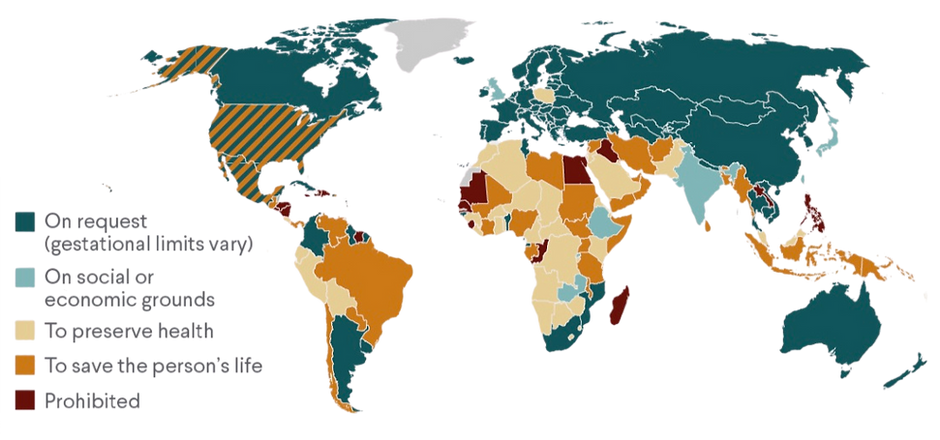Choice Across Borders
Here To Help You Learn
Global Perspectives on Reproductive Justice: Breaking Barriers, Building Equity



Case Studies

Legal Frameworks
90% of abortions in countries with liberal abortion laws are considered safe, compared to 25% of abortions in countries where abortion is banned.
5–13% of maternal deaths worldwide are due to complications from unsafe abortions, most of which occur in developing countries.
Council on Foreign Relations, from Women and Foreign Policy Program staff, updated March 7, 2024

Societal Impact
Even in countries where abortion is legal, it might be difficult to access because of factors like cost, distance to services, social stigma, or religiously reinforced conservative attitudes. For example, medical staff might – and do – refuse to provide abortions on grounds of conscience or religion.
Stigma tends to be strongest regarding young and unmarried sexually active women and can increase the risk of morbidity and mortality due to unsafe abortion because it can provoke a delay in seeking treatment.
Singh, S., García, S. G., Guillaume, A., Okonofua, F., & Prata, N. (2012). The health, social, and economic consequences of unsafe abortion: Papers presented at an IUSSP Seminar, Mexico, 2010. International Journal of Gynecology & Obstetrics, 118, S63-S64. https://doi.org/10.1016/S0020-7292(12)60002-2

Health Outcomes
Unsafe abortions are the third leading cause of preventable maternal deaths worldwide. They are also the cause of five million largely preventable disabilities, according to the World Health Organization.
Data Visuals
Easy to understand information on how things have changed in recent years and how people feel about it

Global Access to Abortion as of 2023

Percent who say abortion should be legal in most or all cases

Marta Lempart, Poland
Founder of the Women’s Strike (Strajk Kobiet), Marta has been at the forefront of mass protests against Poland’s strict abortion laws, particularly after the 2020 Constitutional Tribunal ruling that virtually banned abortion. Despite facing threats and legal action, she continues to fight for women's reproductive rights.
Marta Lempart. (2024, September 23). In Wikipedia. https://en.wikipedia.org/wiki/Marta_Lempart
Dr. Kavita Arora, India
Obstetrician-gynecologist advocating for reproductive health, Dr. Arora highlights how even in countries with liberal laws like India, stigma and lack of awareness limit access to abortion services. She shares stories of rural women who travel miles for care, showing that legal frameworks alone aren't enough without practical accessibility.
Dr. Warren Hern, U.S.A
Warren Hern is a physician whose career in reproductive medicine began before Roe v. Wade and continues today. After Roe’s fall, Hern at age 86 founded the Boulder Abortion Clinic. He is one of the few physicians who openly perform late abortions and has been receiving death threats since 1973. He thinks women are worse off today than they were back then.